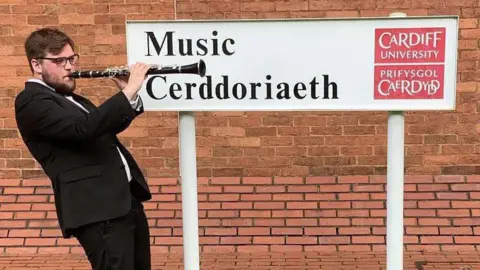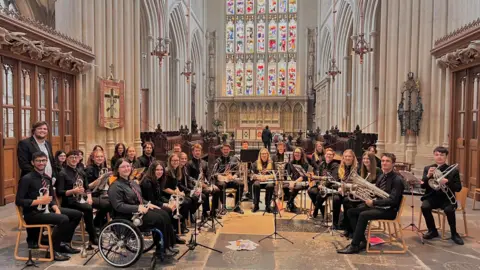'Land of song silenced if university axes arts'
 Ianto Williams
Ianto WilliamsPlans to axe music courses at Cardiff University will silence Wales as the "land of the song", a former student has said.
Conductor of the university's brass band, Ianto Williams, described the proposal as "incomprehensible" as music was the "heart of Wales", adding "the city will go quiet, it will be apocalyptic".
Music is one of the subjects facing cuts at the university - alongside nursing, modern languages, ancient history and religion and theology - as it confirmed plans to cut 400 fulltime jobs amid a funding shortfall earlier this week.
The university said the role cuts were only a proposal and it was committed to an intake for the coming academic year, while current students would be able to finish their degrees.
Angry, confused and upset, is how Mr Williams said he felt following the announcement on Tuesday.
"Wales without music is going to be a desolate, horrible place.
"Music plays such an important part in Welsh history and Welsh culture. It's the soundtrack to our lives," Mr Williams said.
He said there was a lack of understanding around what it took to become a musician, and losing the knowledge base at the institution would be a massive loss, with huge knock-on effects for Wales as a nation.
"It's going to leave Wales as a country with no place on the world stage musically, which is a really soul-destroying thought," he said.
A petition to save the study has gained nearly 15,000 signatures since the announcement, with past and present students rallying together.
 Ianto Williams
Ianto WilliamsMusician and composer Sir Karl Jenkins studied at the School of Music at Cardiff University and said the news was "devastating".
"There is a significant difference between the music department at Cardiff University and the Royal Welsh School of Music and Drama - the degree in Cardiff is very much an academic degree, and challenging.
"Aberystwyth went musically a long time ago, and if Cardiff goes there's only Bangor [University]. Both Cardiff and Bangor are considered the best music departments, notwithstanding Oxbridge, in the UK – along with York University."
He told BBC Radio Wales Breakfast that "money should be found for this".
"It's not just training students through music, it's an investment in the cultural future of our country.
"It has always been an integral part of Welsh academic culture."
 Getty Images
Getty ImagesGerman and Japanese student Theodora Ackers put the arts being axed down to comments made by former Prime Minister Rishi Sunak, about Conservative plans to tackle what they call "mickey mouse degrees".
"He pushed for STEM [science, technology, engineering and mathematics] subjects and a decline in the arts," said the 23-year-old, adding that people should be allowed to study what they enjoy.
The third-year student said the department of modern languages did not receive any internal communication from the university, and found out about the cuts from the media.
She said the situation was "diabolical" and she felt "deeply sorry" for her lecturers.
A spokesperson for Cardiff University said it was always its intention to speak to students and staff first and was "extremely disappointed" that the proposals were leaked to the media.
Ms Ackers described her teachers as "fantastic people", many of which have migrated to Wales and built lives in the city teaching their language.
"Why not make the cuts at the top of the university," she said, referring to the university's Vice- Chancellor, Professor Wendy Larner, whose salary is £290,000 per annum.
"These subjects are so important, why make cuts to the whole subject, why not make some cuts to more subjects?" she added.
 Theodore Ackers
Theodore AckersThe proposed closure of nursing has also raised concerns from union leaders for future nurse supply in Wales.
Helen Whyley, executive director of the Royal College of Nursing Wales, said the university has a "significant pipeline" in delivering nurses to health boards in south Wales.
Adult nursing student, Layla Cahill Harris, said she was distraught and disappointed - but most of all angry for nurses.
"With the state of the NHS in Wales and call-out for nurses, I'm really confused by the decision," she said.
"Nursing is not an easy course to get onto at Cardiff, it's held in high esteem," she said.
"If it's happened to us, it can happen to anyone," adding there was a threat of losing trust and hope in further education.
Ms Harris said cuts could be made elsewhere, such as withdrawing funding for study abroad schemes, as students can receive between £500 to £1000 from the university.
 Layla Cahill Harris
Layla Cahill HarrisThe University and College Union in Wales condemned the plans as "cruel and unnecessary" and called upon the institution to use its reserves of more than £500m instead of axe jobs.
There are several reasons behind the financial difficulties facing UK universities, including lower numbers of international students, partly due changes in visa rules.
But second year French language student Logan Wareham,19, believed shutting down the school of modern languages would make international students even less likely to enrol.
Mr Wareham said the university needed to reconsider all of its choices and come with a better solution.
He was concerned the standards of teaching would go down and students would struggle "badly" as a result.
"I worry for the future of modern foreign languages because if this can happen at a Russell group university, then it can happen anywhere."
 Logan Wareham
Logan WarehamDoctor Flint Dibble, a teacher in archaeology, said the plans were an "absolute decimation" of humanities subjects on a "personal level".
Dr Dibble said humanities were often the target of cuts, but believed the decision had been made in a short-sighted way and would have long-lasting impacts.
"I am absolutely appalled and devastated," he said, adding it was "an alarm bell for everybody out there".
Archaeology is part of the School of History, Archaeology and Religion at Cardiff University, which under the proposal is merging with three other schools into a new school of Global Humanities.
"I think that the decision is ridiculous. It's a big mistake to be cutting such huge, significant and important components of the university.
"We are a major asset for the city, for the nation and for the country as a whole."
Cardiff University's Vice-Chancellor Professor Wendy Larner stressed the plans were proposals and said "final plans will be shaped by our community - both internal and external - through formal consultation".
In a statement, she said a 90 day consultation period would also develop and refine how the university addressed the financial challenge.
A spokesperson added there would be no impact on current students in the immediate term and where programmes closed, "teach out plans will be developed to protect and support those impacted".
